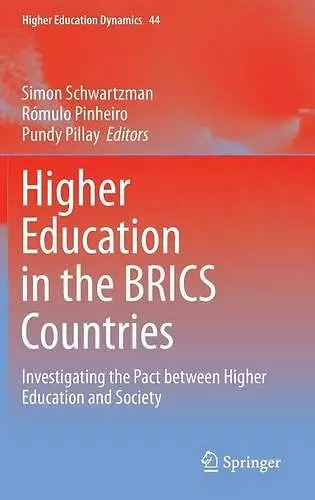Higher Education in the BRICS Countries
Investigating the Pact between Higher Education and Society
Rómulo Pinheiro editor Simon Schwartzman editor Pundy Pillay editor
Format:Hardback
Publisher:Springer
Published:1st Apr '15
Should be back in stock very soon

This insightful exploration of higher education in the BRICS countries reveals complex dynamics influencing educational systems and their societal roles.
In Higher Education in the BRICS Countries, the authors explore the evolving landscape of higher education within the BRICS nations—Brazil, Russia, India, China, and South Africa. Despite the growing significance of these countries on the global stage, there has been a surprising lack of research focused on how social expectations regarding higher education have shifted in recent years. The book challenges the traditional functionalistic perspectives that view education systems as mere tools of government policy, arguing instead that these systems are influenced by a complex interplay of internal and external factors.
The authors emphasize that national higher education systems are not static entities; they develop and change through a dynamic process that includes the aspirations of the population, governmental expectations, market forces, and the unique institutional traditions of each country. This multifaceted approach reveals that higher education cannot be viewed as a monolithic sector. Instead, it is essential to understand the various drivers that shape the relationship between higher education institutions and society, including the increasing role of private firms in the education market.
Ultimately, Higher Education in the BRICS Countries encourages readers to rethink the social compact between higher education and society at large. By examining the interplay of distinct factors that influence this relationship, the book provides valuable insights into how higher education can better serve the needs of diverse communities and adapt to the challenges of an ever-changing global landscape.
“The book is highly recommended for scholars and students who major in or are interested in comparative education and higher education. Moreover, it should be of interest to policy makers and institutional leaders who want to benefit from the insights and policies of BRICS countries. The work of this volume marks an effective opening for future BRICS higher education studies.” (Shuhua Liu, Higher Education, Vol. 71, 2016)
ISBN: 9789401795692
Dimensions: unknown
Weight: unknown
493 pages
2015 ed.